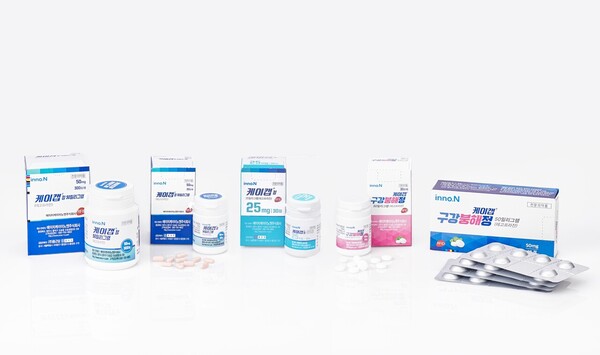HK inno.N is embroiled in a crisis rumor after it lost the first round of patent litigation for the crystalline form of its P-CAB-based gastroesophageal reflux disease (GERD) drug, K-CAB Tab (tegoprazan).
However, the company denied such concerns, expressing confidence about the continued growth of K-CAB.

According to industry sources, the Intellectual Property Trial and Appeal Board (IPTAB) recently upheld a passive scope confirmation appeal filed by 59 pharmaceutical companies, including SCD Pharm, against the K-CAB crystalline patent (a new crystalline form of benzimidazole derivative and method of manufacturing the same).
The decision favored domestic pharmaceutical companies developing generic versions of K-CAB.
The definitive patent is due to expire in March 2036, which means that these pharmaceutical companies will be able to launch generics after August 2031, when the remaining patent for the substance of K-CAB (chromane-substituted benzimidazoles and their use as acid pump inhibitors) expires.
In addition, the market is concerned about K-CAB's slowing sales growth due to the promotion of similar products, such as Daewoong Pharmaceutical's Fexuclue (fexuprazan).
In response, HK inno.N has come forth to calm down such jitters in a separate statement.
HK inno.N rejected the allegation about K-CAB’s possible negative growth.
Skeptics estimated P-CAB's total market size at 250 billion won ($190 million) this year and said that if K-CAB's competitors record more than 100 billion won in sales, it could cause K-CAB, which recorded prescription sales of 158.2 billion won last year, to record a minus growth.
"The P-CAB market size forecast of 250 billion won in 2024 is an arbitrary projection without any basis, and the pace of PPI substitution of P-CABs is accelerating," HK inno.N said. "The share of P-CAB products in the peptic ulcer drugs market increased from 18.7 percent in the fourth quarter of 2023 to 19.8 percent in February 2024, and they will continue replacing PPIs and grow."
The company went on to say, "Prescriptions in January 2024 grew 30.1 percent year-on-year, and February prescriptions grew 32.3 percent YoY, securing a 14 percent share of the peptic ulcer medication market for the first time. Following the termination of our existing co-promotion partner, synergies with our new partner are being maximized, and our growth prospects for 2024 are very positive."
HK inno.N also dismissed the question of whether K-CAB's competing products would negatively impact its growth if it collaborated with Chong Kun Dang, its former partner.
"We have received many such inquiries in 2022 when the competing product was launched. There were many negative predictions that K-CAB's growth would stop or reverse due to the competitor's sales power. Still, K-CAB continued to grow at a high rate of 20 percent per year even after the launch of the competitor's product," HK inno.N said.
According to the company, the market share of peptic ulcer medicines (P-CAB series) was in the low 10-percent range when there was only one P-CAB product. It has grown to 19.8 percent now, as P-CAB and its competitors have grown the market pie by replacing PPIs, and P-CAB's share expansion is still expected to be very high.
It is also worth mentioning that K-CAB has maximized the synergies of new partnerships without any impact while terminating partnerships with existing partners, showing accelerated growth of 30 percent in January and February, the company said.
"As a result, P-CAB's market growth is very positive, and in the competitive landscape, K-CAB has a strong competitive advantage in terms of indications, clinical data, and formulation. This is something we have proven in the past." HK inno.N added.
Related articles
- Kolmar Korea Holdings invests in ADC developer ProEn Therapeutics
- HK inno.N’s GERD drug K-CAB gets sales nod in Chile
- AstraZeneca, HK inno.N team up to boost sales of diabetes drugs
- HK inno.N’s CAR-T cell therapy chosen as state-subsidized new drug project
- Boryung, HK inno.N to co-market their flagship hypertension and GERD drugs
- HK inno.N’s K-CAB chosen as outstanding technology leading Korean industry

